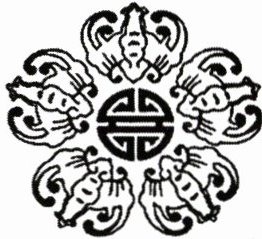第二节:阅读下面短文,从短文后所给的选项中选出能填入短文空白处的最佳选项,使短文通顺连贯,其中有两项是多余选项。(共 5 小题;每小题 2 分,满分 10 分)(2025·江苏宿迁宿豫区期中)
Chinese people often say “*wu fu linmen*” or “The five blessings have come to the house”. ______

The “five blessings” come from *The Book of Documents*. The first blessing is long life. The second is wealth. The third is health. The fourth is love of virtue(美德). ______ Look at this picture. There are five bats in it. Chinese artists have long used five bats to stand for the five blessings. Why? ______
The Chinese character *fu* means blessings, happiness and good luck in Chinese. It appears in all kinds of things such as paper - cuts and posters. ______ For example, people put up the Chinese character *fu* on doors and walls during the Spring Festival. Often, people paste(粘贴) it upside down. The Chinese characters for “upside - down” and “to arrive” are both pronounced *dao*. ______
A. What are the “five blessings”?
B. And the last one is a peaceful death.
C. The number five represents the “five blessings”.
D. Because *bianfu*, the Chinese name for bats, includes *fu*.
E. This shows Chinese people's wishes for happiness and good luck.
F. We should think about how to introduce Chinese culture to the world.
G. So *fudao* means “good luck arrives”.
16.
Chinese people often say “*wu fu linmen*” or “The five blessings have come to the house”. ______

The “five blessings” come from *The Book of Documents*. The first blessing is long life. The second is wealth. The third is health. The fourth is love of virtue(美德). ______ Look at this picture. There are five bats in it. Chinese artists have long used five bats to stand for the five blessings. Why? ______
The Chinese character *fu* means blessings, happiness and good luck in Chinese. It appears in all kinds of things such as paper - cuts and posters. ______ For example, people put up the Chinese character *fu* on doors and walls during the Spring Festival. Often, people paste(粘贴) it upside down. The Chinese characters for “upside - down” and “to arrive” are both pronounced *dao*. ______
A. What are the “five blessings”?
B. And the last one is a peaceful death.
C. The number five represents the “five blessings”.
D. Because *bianfu*, the Chinese name for bats, includes *fu*.
E. This shows Chinese people's wishes for happiness and good luck.
F. We should think about how to introduce Chinese culture to the world.
G. So *fudao* means “good luck arrives”.
16.
A
17. B
18. D
19. E
20. G
答案:16.A 17.B 18.D 19.E 20.G
解析:
翻译:
第二节:阅读下面短文,从短文后所给的选项中选出能填入短文空白处的最佳选项,使短文通顺连贯,其中有两项是多余选项。(共5小题;每小题2分,满分10分)(2025·江苏宿迁宿豫区期中)
中国人常说“五福临门”。______
“五福”出自《尚书》。第一福是长寿。第二福是富贵。第三福是康宁。第四福是好德。______看这幅画,里面有五只蝙蝠。中国艺术家长期以来用五只蝙蝠来代表五福。为什么呢?______
汉字“福”在中文里意味着福气、幸福和好运。它出现在各种各样的事物中,比如剪纸和海报。______例如,春节期间人们会在门和墙上张贴“福”字。通常,人们会把它倒着贴。“倒”和“到”的汉字发音都是“dào”。______
A. “五福”是什么呢?
B. 最后一福是善终。
C. 数字“五”代表“五福”。
D. 因为蝙蝠的中文名称“biān fú(蝙蝠)”包含“fú(福)”。
E. 这体现了中国人对幸福和好运的祈愿。
F. 我们应该思考如何向世界介绍中国文化。
G. 所以“fú dào(福到)”意味着“好运到了”。
16. ______ 17. ______ 18. ______ 19. ______ 20. ______
第二节:阅读下面短文,从短文后所给的选项中选出能填入短文空白处的最佳选项,使短文通顺连贯,其中有两项是多余选项。(共5小题;每小题2分,满分10分)(2025·江苏宿迁宿豫区期中)
中国人常说“五福临门”。______
“五福”出自《尚书》。第一福是长寿。第二福是富贵。第三福是康宁。第四福是好德。______看这幅画,里面有五只蝙蝠。中国艺术家长期以来用五只蝙蝠来代表五福。为什么呢?______
汉字“福”在中文里意味着福气、幸福和好运。它出现在各种各样的事物中,比如剪纸和海报。______例如,春节期间人们会在门和墙上张贴“福”字。通常,人们会把它倒着贴。“倒”和“到”的汉字发音都是“dào”。______
A. “五福”是什么呢?
B. 最后一福是善终。
C. 数字“五”代表“五福”。
D. 因为蝙蝠的中文名称“biān fú(蝙蝠)”包含“fú(福)”。
E. 这体现了中国人对幸福和好运的祈愿。
F. 我们应该思考如何向世界介绍中国文化。
G. 所以“fú dào(福到)”意味着“好运到了”。
16. ______ 17. ______ 18. ______ 19. ______ 20. ______
四、词汇运用。(共 10 小题;每小题 1 分,满分 10 分)
根据短文意思和首字母提示,写出一个完整正确的单词。
English is my favourite subject and Mr Smith is my favourite English teacher. He is from the UK and has l 1 in China for about five years. He has short hair and bright blue eyes. He is about 1. 88 metres tall and he looks strong. He is the y 2 one among all my teachers. I like talking with him b 3 we have some shared interests.
I really like his English classes. The first reason for this is that h 4 classes are relaxing. The s 5 reason is that Mr Smith is kind. We are all happy to have a teacher l 6 him. He teaches us p 7. He always smiles at us and never gets angry, even though some of my classmates are always noisy and make him u 8. We really enjoy h 9 his classes.
Mr Smith is the b 10 teacher I've ever had. I really admire(钦佩) him.
1.
6.
根据短文意思和首字母提示,写出一个完整正确的单词。
English is my favourite subject and Mr Smith is my favourite English teacher. He is from the UK and has l 1 in China for about five years. He has short hair and bright blue eyes. He is about 1. 88 metres tall and he looks strong. He is the y 2 one among all my teachers. I like talking with him b 3 we have some shared interests.
I really like his English classes. The first reason for this is that h 4 classes are relaxing. The s 5 reason is that Mr Smith is kind. We are all happy to have a teacher l 6 him. He teaches us p 7. He always smiles at us and never gets angry, even though some of my classmates are always noisy and make him u 8. We really enjoy h 9 his classes.
Mr Smith is the b 10 teacher I've ever had. I really admire(钦佩) him.
1.
lived
2. youngest
3. because
4. his
5. second
6.
like
7. patiently
8. unhappy
9. having
10. best
答案:1. lived 2. youngest 3. because 4. his 5. second 6. like 7. patiently 8. unhappy 9. having 10. best
解析:
翻译:
四、词汇运用。(共10小题;每小题1分,满分10分)
根据短文意思和首字母提示,写出一个完整正确的单词。
英语是我最喜欢的学科,史密斯先生是我最喜欢的英语老师。他来自英国,已经在中国生活了大约五年。他留着短发,有着明亮的蓝色眼睛。他大约1.88米高,看起来很强壮。他是我所有老师中最年轻的一个。我喜欢和他交谈,因为我们有一些共同的兴趣。
我真的很喜欢他的英语课。第一个原因是他的课很轻松。第二个原因是史密斯先生很和蔼。我们都很高兴有像他这样的老师。他教我们很有耐心。他总是对我们微笑,从不生气,即使我的一些同学总是很吵闹,让他不高兴。我们真的很喜欢上他的课。
史密斯先生是我遇到过的最好的老师。我真的很钦佩他。
1. ______ 2. ______ 3. ______ 4. ______ 5. ______
6. ______ 7. ______ 8. ______ 9. ______ 10. ______
四、词汇运用。(共10小题;每小题1分,满分10分)
根据短文意思和首字母提示,写出一个完整正确的单词。
英语是我最喜欢的学科,史密斯先生是我最喜欢的英语老师。他来自英国,已经在中国生活了大约五年。他留着短发,有着明亮的蓝色眼睛。他大约1.88米高,看起来很强壮。他是我所有老师中最年轻的一个。我喜欢和他交谈,因为我们有一些共同的兴趣。
我真的很喜欢他的英语课。第一个原因是他的课很轻松。第二个原因是史密斯先生很和蔼。我们都很高兴有像他这样的老师。他教我们很有耐心。他总是对我们微笑,从不生气,即使我的一些同学总是很吵闹,让他不高兴。我们真的很喜欢上他的课。
史密斯先生是我遇到过的最好的老师。我真的很钦佩他。
1. ______ 2. ______ 3. ______ 4. ______ 5. ______
6. ______ 7. ______ 8. ______ 9. ______ 10. ______